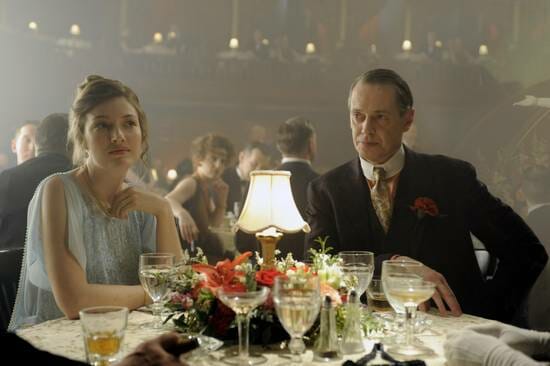
Although there’s no titular lead character, Boardwalk Empire is in nearly every other way Nucky Thompson’s show. Likewise, it’s also a mob show, and like other mob narratives one of the chief concerns is for who makes it out alive. These two aspects of Empire are in some ways in conflict with each other from the very beginning in that giving the show over so heavily to one character means that there’s a loss of tension as to whether he’ll make it out of an episode alive—the essential question of if he’ll be the one whacked is already answered by his appearance as the sole individual in the opening credits. Since there’s a second season of the show already on the way, there’s not even a question about the season finale: Nucky’s essentially untouchable.
One of the reasons that Empire changed the actual Nucky Johnson’s name to Thompson was to put a little bit more unpredictability back into the show. No, you still can’t kill the guy, but the rest of his life can be shaped by the needs of the show rather than just recounting his biography. Conversely, though, he’s surrounded by a number of real figures from the period who pass through, namely Al Capone, Charles Luciano, Arnold Rothstein and Warren Harding, all well-known individuals who survived for many years. They’re just as off-limits as Nucky is, which means that there’s little tension about their survival, either.
This issue comes to a head in “Belle Femme,” since violence is finally becoming truly serious on the Boardwalk. After Eli’s wounding, major characters are now in play as possible victims and Rothstein intends to make Nucky the next one. Not much of the episode is actually about this attempted assassination that goes awry, but of course Nucky is uninjured and Margaret’s dress is merely stained with blood. The mob war between Atlantic City and New York has truly begun, but it’s happened just as ineffectually as expected.
But much of the episode is concerned with the ramifications of Jimmy’s return. He and Nucky are still a bit at odds with one another, but he agrees to go after Luciano. Of course, since Luciano is a protected character, his assassination attempt fails as well and instead Jimmy is brought in by Van Alden. A witness is going to testify against him, but is instead killed by Van Alden’s assistant on the way to a federal prison in an almost jarringly artful scene. Jimmy’s return also means the end of his wife’s affair with the photographer’s wife, just before she enters into a polygamous relationship with both of them. The end of her affair also brings with it the end of her art prospects, as the photographer was simply complimenting her in order to get her into bed.
Despite the lack of bloodshed involved, my favorite part of the episode was in fact Margaret’s. While early episodes didn’t know what to do with her, she’s grown in importance and seems likely to rise even higher when the 19th Amendment is passed. After hearing that the dress shop she worked in is going out of business, she uses her leverage with Nucky to keep it around while also extorting it for free dresses for herself and her daughter. The way she’s learning how to use her own power is done elegantly and while the staining of the dress at the episode’s conclusion is heavy-handed, it doesn’t dampen the importance of what’s going on here.
A lot of the episode was in fact undercut by our knowledge of where it couldn’t head, but then again, the surprises along the way, while nice, aren’t really what the show’s about. The intricate power relationships of American citizens and government and what it all means is what’s given some real polish, and in this area it shined wonderfully. Little moments like Nucky coolly considering the futures of the mayor and his brother or Rothstein playing pool through his lecture to the hit-men are beautiful television. The big moments this week weren’t as riveting as perhaps the show’s creators would like, but the rest of it was thoughtful and engaging enough that it was easy to look past.
Stray Observations:
• It’s hard to have much pity for the racist, exploitative dress-shop owner. Weirder is that Margaret, who’s actually exploited by her, would have any sort of empathy. Then again, if she’s able to get a new dress regularly it’s probably worth it. We’ll see if she’s working her own miniature mob-angle there.
• The Road to Oz is extremely odd as a choice of reading in Nucky’s house-hold. Next episode is also named after the Oz series. I’m curious to see where this is heading—books in Empire are never just reading material.
• “Everyone in Paris is doing it” is always the best reason to join in on a three-way.
• The movie Jimmy claims to have been watching is, in fact, not even 78 minutes.
• The panic in Nucky’s eyes when being asked, “don’t you want me to look nice?” is pretty wonderful. It’s great seeing that bit of his typical humanity under the facade.
• And so the question of Jimmy’s dad’s identity has its ante upped a bit. This also means that theories he’s in fact Nucky’s son are (at least largely) incorrect.
• How weird is it to tell the guy you’re killing what alibi you’re going to be using?
• “1920—the world belongs to the young.”
• I actually find it more palatable that there’s a “human cannibal” being advertised in Atlantic City rather than, say, a dog one or a monkey one. Maybe that’s just me.